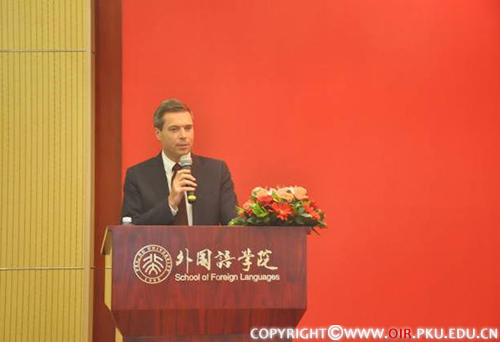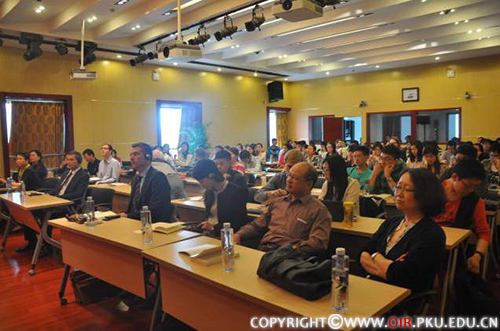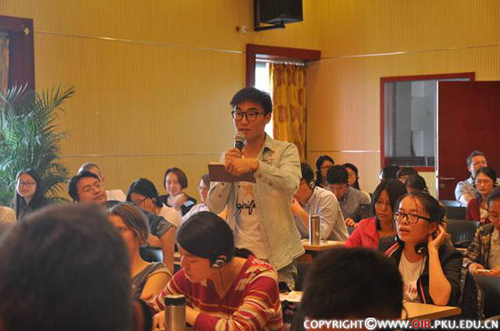German ambassador Michael Clauss visits Peking University
May 21, 2015
Peking University, May 18, 2015: In the afternoon of May 5th, German ambassador Michael Clauss (Ke Muxian) gave a speech with the theme “From the German perspective, how will China change the world? In what aspects can China and Germany cooperate?” (Wie China aus deutscher Perspektive die Welt verändert - welche Möglichkeiten der Zusammenarbeit Deutschland und China gibt es?). The event is hosted by Professor Huang Liaoyu, director of the German Department of the School of Foreign Languages and director of German Studies Center of Peking University.
The speech was divided into three parts. Firstly, Ambassador Clauss talked about the rise of China and some challenges China is facing. China is expected to become the biggest economic entity at some point between 2020 and 2025 based on its increase in GDP. With the development of economy, its military force is booming. But China is also facing many challenges, especially in dealing with international relations.
Secondly, China and Germany both seek common grounds while reserving differences. He thinks the role of China in Asia is similar to that of Germany in Europe – neighboring countries all deem us as potential threats in our respective regions. Both China and Germany should pay attention to their relationships with neighboring countries and impel their economy with the vigor of our own economy. Besides, the two countries both put more emphasis on industrial manufacture and the real economy, neglecting the service industry. We have begun economic reform at a very early stage and have achieved prominent effects. We have smoothed out several worldwide economic crises. In addition, people of the two countries are very economical. The difference of China and Germany lies in their political system. Germany is a federal parliamentary republic while China is of the People's Congress System. But the two governments respect each other’s political system and have always been in a trustful cooperation.
The third is on Sino-German communication and cooperation. Ambassador Clauss listed three aspects. The first is of diplomatic policies. China and Germany have a lot in common regarding the attitude towards international issues. They do not hold the same position as many other Western countries on the Iraqi issue, reject interfering with problems of Libya and Syria and hold a fair attitude towards Ukraine. The second is of the Asian Infrastructure Investment Bank led by China. Germany hopes that China will have more say in international finance and monetary. The third is “Industry 4.0”, a high-tech strategy plan proposed by the German government, which corresponds with the Chinese plan, “Made in China 2025”.
The speech lasted for more than twenty minutes. It was followed by a forty-minute Q&A session. Below is an excerpt from the records.
Q: How will Germany function in the “One Belt, One Road” Initiative? There is now a direct railway link between China and Duisburg, but there doesn’t seem to be much interest in the railway line among German entrepreneurs when I attended the Hamburg Summit. How can we make better use of this railway? Also, Germany no longer treats China as a developing country, and it has been giving less help to China as it enters the age of no money shortages, so how should we view the relationship between the two countries?
A: Let’s first talk about the “One Belt, One Road” Initiative. I was also present when president Xi Jinping welcomed the train from Chongqing to Duisburg with the German vice president at the railway station. The train was decorated beautifully and deeply impressed me. The “One Belt, One Road” Initiative is very beneficial for the German economy, especially for those German entrepreneurs who want to transport their products to China as fast as possible. If the products can be transported from Berlin to China within 14 days, the purpose of the railway will be more significant. From the political aspect, the Silk Road keeps the economy of the countries along it stable and it also helps to stabilize the relationships among those countries. Germany will continue to hold an open attitude towards long-term programs with other countries and it is willing to promote them.
The traditional pattern of assisting China is gradually disappearing, because China has made decent progress in economy. It is meaningless to continue doing it. But we have some very good platforms on which we can cooperate, like Industry 4.0. I think this is the most promising platform for both countries to build closer ties with each other on an equal basis. In addition, China is strengthening its rule of law, on which President Xi Jinping has placed heavy emphasis, so we have much room for cooperation in this realm as well.. Since 2000, China and Germany has been discussing how to solve some practical problems through legal means, in order to modernize the legal systems of the two countries. So I think we should establish a new pattern of cooperation after abandoning the traditional way of economic assistance.
Q: Some people think that the economic and trade relations between China and Germany is not complementary but competitive. What do you think of this question?
A: I think the two kinds of relations coexist. It depends on which economic field we are talking about. Germany stays ahead in some fields like automotive industry. The sales of high-end luxury cars in China steadily increases by 25% every year. China stays ahead in other fields like textile, as the cost of production is lower compared to many other countries. On the whole, this kind of competition will encourage German enterprises to innovate and the German economy will also become more dynamic. Germany is strong because it’s competitive. The automobile brands in Germany, like Benz, BMW and Volkswagen are all of very good quality internationally. We have achieved excellent sales in our competition with Japanese brands. So, the more intensive the competition is, the better our German products will be.
The lecture was brought to a close upon the completion of the Q&A session. Afterwards, Ambassador Clauss toured around the campus as he wrapped up his memorable visit to Peking University for both him and the university students.
Written by: Zhang Yuyao
Edited by: Yan Shengnan & Xu Liangdi



